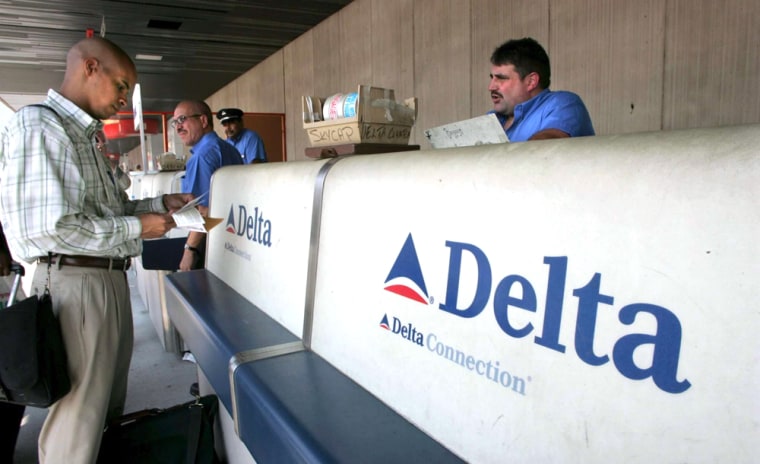With four of the nation’s 10 biggest air carriers in bankruptcy, business and leisure travelers have every reason to wonder whether their plans will be affected.
So far, the somewhat surprising answer is that air travelers have little reason to worry, industry experts say.
Both United Airlines and U.S. Airways have managed to fly with little disruption despite operating under bankruptcy protection. There is every indication that Delta Air Lines and Northwest Airlines, both of which filed for Chapter 11 protection Wednesday, will be able to do the same.
Here are some common questions and answers for passengers considering air travel soon or already holding tickets:
I’m considering traveling to visit my family for Christmas. Should I avoid Delta and Northwest?
No. Industry experts recommend you choose your carrier as usual, based on price, convenience and personal preference. But as always, it is highly recommended that you pay by credit card. That way if there is any dispute over flight cancellations you will have a better chance of getting your money back.
I already hold tickets on Delta or Northwest. Should I be concerned about my flights?
No, but be sure and check the status before you head to the airport. Airlines are using bankruptcy laws to reduce their costs, and often that can mean eliminating aircraft and reducing schedules. Airlines should notify you if your flight has been changed or cancelled, but it is always safer to verify that your flight is still departing as scheduled.
What about booking travel farther into the future?
Travel industry attorney Jeffrey Miller recommends travelers avoid booking flights on Delta and Northwest more than six months into the future, because schedules are virtually certain to change. Based on past bankruptcies, both carriers are likely to reduce frequency on some routes and eliminate other routes entirely. That means a convenient, non-stop flight could be replaced by a far less convenient flight with a connection and a long layover.
If my flight is cancelled, do I have any options?
Yes, you can demand a refund, according to Christopher Elliott, a travel columnist for MSNBC.com and other publications. But Miller cautions that airlines will not necessarily make it easy to get a refund. Be prepared to do battle, or to be flexible in your travel plans. Elliott recommends travelers read the “contract of carriage” that easily can be found on the various airline Web sites. (Delta’s, which is 55 pages long but relatively easy to understand, is available here.)
What about my frequent-flier miles?
In virtually every case, airlines have worked hard to ensure that accrued miles remain valid. Delta and Northwest will probably almost immediately ask bankruptcy judges to allow them to continue operating their mileage programs. “Frequent-flier miles are a liability in the regular days of business but actually an asset when you are in bankruptcy. It’s one of the few forms of customer loyalty you have,” said David Field, Americas editor for Airline Business magazine. But mileage holders are essentially unsecured creditors, so it is wise to cash in your points when you are able rather than stockpiling them.
Are there any airlines to avoid?
Most carriers in bankruptcy are expected to reorganize and emerge with little impact on travelers. But some analysts are cautioning that Independence Air, formerly known as Atlantic Coast Airlines, could go out of business. If you have paid for your ticket using a credit card, you will get a refund. But other carriers are unlikely to honor the ticket, so you might be out of luck with your travel plans, said Miller. A spokesman for the carrier, based in Dulles, Va., said the airline is operating "business as usual" as it considers options to strengthen its financial position. "Everything is on the table for consideration," said the spokesman, Rick DeLisi.
Is there any other impact likely for consumers?
Higher fares. As airlines retrench, they will cancel leases and cut service, reducing the supply of available airline seats. That will make it easier for carriers to impose rate hikes and make them stick. Higher fuel costs, which are helping to drive carriers into bankruptcy protection. also are likely to force up the cost of air travel.
